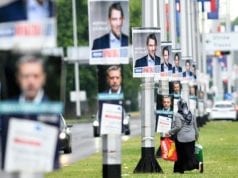
 (Bloomberg) — The financial bonanza the Trump administration envisions for the Palestinians is unlikely to materialize unless there’s progress toward resolving the 70-year-old conflict with Israel, according to a top U.S. envoy.“If we’re not going to get traction on the political aspect of the deal, I’m not sure we would take the time to try to get pledges,” U.S. special envoy Jason Greenblatt said at an economic conference to drum up support for the U.S. plan in Bahrain on Wednesday. “A lot of pledges get made to help the Palestinian people. Many of them are never actually paid anyway. But if we do see traction, then absolutely.”President Donald Trump’s son-in-law and senior adviser, Jared Kushner, promoted the economic component of his long-promised initiative for Middle East peace with the workshop in Bahrain this week, where he called for about $50 billion in proposed investments in the Palestinian territories and neighboring countries that host refugees. The more divisive political aspect of the plan isn’t expected to be revealed until later this year.His economic road map, published days before the Bahrain event, makes little mention of how to resolve the political troubles at the heart of conflict. High-profile speakers from government and business mostly sidestepped those thorny questions to focus on general themes of governance and entrepreneurship as the key to prosperity for the Palestinians.But Greenblatt’s comments appeared to undermine the Trump administration’s contention that an economic strategy should come before Kushner’s still-delayed political proposal on core issues, from the fate of Palestinians’ bid for statehood to the status of Jerusalem.“Gaza is a mess. There is no meaningful way to help the people of Gaza until we figure out how to stop the terrorist attacks from Hamas. That’s pure and simple,” he told reporters on the sidelines of the conference. It’s “hard to predict where the Palestinian Authority is going, hard to predict what Hamas is going to do.”Near CollapseThe U.S. effort comes as the West Bank-based Palestinian Authority is near financial collapse. Gaza, which is run by the Islamist Hamas group, is straining under an Israeli and Egyptian blockade that has lasted more than a decade as well as more recent sanctions by the Palestinian Authority. Its economy relies heavily on aid, unemployment is high, travel is difficult and power cuts happen daily.The White House wanted to use the event in Bahrain to persuade other countries to pick up the tab for economic development and put the heat on Palestinians to accept the blueprint.Treasury Secretary Steven Mnuchin said he expects to collect about $4 billion in pledges this week and that the U.S. was willing to revise the plan if that would help it win international support.“We want this to become an international plan,” he said. “We’re looking for changes. We’re looking for additions. We’re looking for buy-in.”Though it boasted big names including International Monetary Fund chief Christine Lagarde and Blackstone Group CEO Stephen Schwarzman, the conference met with less-than-expected interest from the business community. Only a fraction of more than 1,000 business leaders invited attended, according to a person familiar with the matter.Gulf Arab ministers said their countries, which have helped to rebuild Gaza after successive wars with Israel, were willing to support any efforts that would help the Palestinian people — provided these were acceptable to them.“The way to make the people on the ground believe is to give them hope that this will be sustainable,” said Mohammed Al Sheikh, a Saudi minister of state.Spurned by PalestiniansPalestinian leaders, however, have spurned Kushner’s proposal as an effort to bribe them into accepting an eventual Trump plan that will favor Israel. Kushner said the Palestinian leadership discouraged all but a small contingent of entrepreneurs and investors from attending. Palestinian leaders broke off contact with the U.S. administration after Trump’s decision to move the U.S. embassy to Jerusalem, part of which they want as the capital of a future state, and to close down their diplomatic mission in Washington.The other main beneficiaries of a potential deal were also conspicuous by their absence. Israeli and Palestinian officials weren’t invited. Neighbors Lebanon and Syria didn’t go. Jordan and Egypt, which stand to gain billions of dollars under Kushner’s vision, sent mid-level delegations, suggesting expectations were low.Unlikely Settler-Palestinian Duo Eyes Big Bucks at Bahrain MeetIn his opening remarks on Tuesday, Kushner gave a sales pitch reflecting his background as real estate developer, displaying a video that conjured up modern buildings and lush greenery sprouting from impoverished Palestinian villages.The high-concept video of an economic oasis wasn’t a new technique for the Trump administration: In 2018, the president showed North Korea’s Kim Jong Un a mock movie trailer on an iPad that depicted alternative futures for his regime — of warfare and ruin or skyscrapers under construction if he gave up his nuclear arsenal.The sole Palestinian to speak at the event was Ashraf Jabari, a controversial businessman who faced criticism at home for attending an event many Palestinians see as an effort to buy out their aspiration for statehood.Visibly sweating, he tried to steer the conversation toward politics as the moderator repeatedly interrupted.“Honestly, we support and demand an independent Palestinian country on the lands that Israel occupied in 1967,” Jabari said. “This is the goal of every Palestinian.”Speaking to reporters at the end of the event, Kushner acknowledged the need for a political solution between Israel and the Palestinians to ground his vision but said the two tracks were separate, even though he’s overseeing both.“The people who worked on the economic plan are not aware of what the political plan is,” he said. “So what we tried to do this today is keep this devoid of politics, because again, we have the political plan which we’ll talk about at the right time.”–With assistance from Lin Noueihed, Ivan Levingston, Sammy Criscitello, Saud Abu Ramadan, Sarah Algethami, Donna Abu-Nasr and David Wainer.To contact the reporter on this story: Vivian Nereim in Manama at [email protected] contact the editors responsible for this story: Lin Noueihed at [email protected], Larry LiebertFor more articles like this, please visit us at bloomberg.com©2019 Bloomberg L.P.
(Bloomberg) — The financial bonanza the Trump administration envisions for the Palestinians is unlikely to materialize unless there’s progress toward resolving the 70-year-old conflict with Israel, according to a top U.S. envoy.“If we’re not going to get traction on the political aspect of the deal, I’m not sure we would take the time to try to get pledges,” U.S. special envoy Jason Greenblatt said at an economic conference to drum up support for the U.S. plan in Bahrain on Wednesday. “A lot of pledges get made to help the Palestinian people. Many of them are never actually paid anyway. But if we do see traction, then absolutely.”President Donald Trump’s son-in-law and senior adviser, Jared Kushner, promoted the economic component of his long-promised initiative for Middle East peace with the workshop in Bahrain this week, where he called for about $50 billion in proposed investments in the Palestinian territories and neighboring countries that host refugees. The more divisive political aspect of the plan isn’t expected to be revealed until later this year.His economic road map, published days before the Bahrain event, makes little mention of how to resolve the political troubles at the heart of conflict. High-profile speakers from government and business mostly sidestepped those thorny questions to focus on general themes of governance and entrepreneurship as the key to prosperity for the Palestinians.But Greenblatt’s comments appeared to undermine the Trump administration’s contention that an economic strategy should come before Kushner’s still-delayed political proposal on core issues, from the fate of Palestinians’ bid for statehood to the status of Jerusalem.“Gaza is a mess. There is no meaningful way to help the people of Gaza until we figure out how to stop the terrorist attacks from Hamas. That’s pure and simple,” he told reporters on the sidelines of the conference. It’s “hard to predict where the Palestinian Authority is going, hard to predict what Hamas is going to do.”Near CollapseThe U.S. effort comes as the West Bank-based Palestinian Authority is near financial collapse. Gaza, which is run by the Islamist Hamas group, is straining under an Israeli and Egyptian blockade that has lasted more than a decade as well as more recent sanctions by the Palestinian Authority. Its economy relies heavily on aid, unemployment is high, travel is difficult and power cuts happen daily.The White House wanted to use the event in Bahrain to persuade other countries to pick up the tab for economic development and put the heat on Palestinians to accept the blueprint.Treasury Secretary Steven Mnuchin said he expects to collect about $4 billion in pledges this week and that the U.S. was willing to revise the plan if that would help it win international support.“We want this to become an international plan,” he said. “We’re looking for changes. We’re looking for additions. We’re looking for buy-in.”Though it boasted big names including International Monetary Fund chief Christine Lagarde and Blackstone Group CEO Stephen Schwarzman, the conference met with less-than-expected interest from the business community. Only a fraction of more than 1,000 business leaders invited attended, according to a person familiar with the matter.Gulf Arab ministers said their countries, which have helped to rebuild Gaza after successive wars with Israel, were willing to support any efforts that would help the Palestinian people — provided these were acceptable to them.“The way to make the people on the ground believe is to give them hope that this will be sustainable,” said Mohammed Al Sheikh, a Saudi minister of state.Spurned by PalestiniansPalestinian leaders, however, have spurned Kushner’s proposal as an effort to bribe them into accepting an eventual Trump plan that will favor Israel. Kushner said the Palestinian leadership discouraged all but a small contingent of entrepreneurs and investors from attending. Palestinian leaders broke off contact with the U.S. administration after Trump’s decision to move the U.S. embassy to Jerusalem, part of which they want as the capital of a future state, and to close down their diplomatic mission in Washington.The other main beneficiaries of a potential deal were also conspicuous by their absence. Israeli and Palestinian officials weren’t invited. Neighbors Lebanon and Syria didn’t go. Jordan and Egypt, which stand to gain billions of dollars under Kushner’s vision, sent mid-level delegations, suggesting expectations were low.Unlikely Settler-Palestinian Duo Eyes Big Bucks at Bahrain MeetIn his opening remarks on Tuesday, Kushner gave a sales pitch reflecting his background as real estate developer, displaying a video that conjured up modern buildings and lush greenery sprouting from impoverished Palestinian villages.The high-concept video of an economic oasis wasn’t a new technique for the Trump administration: In 2018, the president showed North Korea’s Kim Jong Un a mock movie trailer on an iPad that depicted alternative futures for his regime — of warfare and ruin or skyscrapers under construction if he gave up his nuclear arsenal.The sole Palestinian to speak at the event was Ashraf Jabari, a controversial businessman who faced criticism at home for attending an event many Palestinians see as an effort to buy out their aspiration for statehood.Visibly sweating, he tried to steer the conversation toward politics as the moderator repeatedly interrupted.“Honestly, we support and demand an independent Palestinian country on the lands that Israel occupied in 1967,” Jabari said. “This is the goal of every Palestinian.”Speaking to reporters at the end of the event, Kushner acknowledged the need for a political solution between Israel and the Palestinians to ground his vision but said the two tracks were separate, even though he’s overseeing both.“The people who worked on the economic plan are not aware of what the political plan is,” he said. “So what we tried to do this today is keep this devoid of politics, because again, we have the political plan which we’ll talk about at the right time.”–With assistance from Lin Noueihed, Ivan Levingston, Sammy Criscitello, Saud Abu Ramadan, Sarah Algethami, Donna Abu-Nasr and David Wainer.To contact the reporter on this story: Vivian Nereim in Manama at [email protected] contact the editors responsible for this story: Lin Noueihed at [email protected], Larry LiebertFor more articles like this, please visit us at bloomberg.com©2019 Bloomberg L.P.








